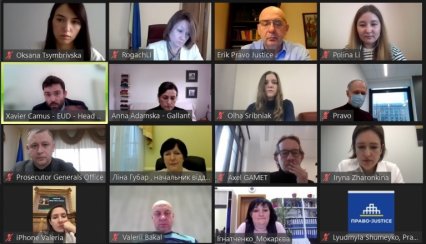Contact center of the Ukrainian Judiciary 044 207-35-46

Larysa Rohach, Secretary of the Grand Chamber of the Supreme Court, and Lina Hubar, Head of the Division of International and Legal Cooperation of the Supreme Court, took part in the first meeting of the Steering Committee of the EU Project "The Support to Justice Sector Reforms and Digitalization in Ukraine" (Pravo-Justice II) which took place on February 17, 2022. The project will continue the "sector approach" of the previous EU Project "The Support to Justice Sector Reforms in Ukraine" (Pravo-Justice) and will focus on developing strategic planning, coordination, monitoring and evaluation of the activities of Ukrainian justice sector institutions, judicial reform, enforcement of judgments and digitalization of the court.
During the meeting, the representatives of the EU Project Pravo-Justice II explained in more detail their further work in each of the work components.
Larysa Rohach congratulated the participants of the meeting of the Steering Committee of the EU Project Pravo-Justice II and thanked for the reliable and lasting partnership, fruitful cooperation between the Supreme Court and the EU Project Pravo-Justice. She expressed the hope that the partnership would remain one of the priorities for the SC, in particular, given that the project had provided effective assistance to the SC in developing approaches to ensure the unity and sustainability of case law, strengthening and expanding knowledge in the field of European and international standards and case law. The SC has been particularly active in cooperating with this Project within the framework of the Justice component (in particular, the subcomponent “Improving judges' knowledge of best practices and European standards”).
Among the main achievements of the cooperation, the Secretary of the SC Grand Chamber focused on raising the awareness of judges and staff of the Supreme Court on EU law and the case law of the European Court of Justice, their enforcement in Ukraine. It was important to conduct, in cooperation with the Permanent Bureau of the Hague Conference on Private International Law, a series of seminars for SC judges and their assistants on the application and understanding of the Hague Conference tools. In addition, the project provided expert and technical assistance in conducting a number of scientific and practical events by the Supreme Court.
"The support for the development of the search Database of Legal Positions of the Supreme Court, which was launched in July 2021, was important. It seems to be a technical issue, but it is of particular importance for the unity of case law in Ukraine. The operation and use of the Database of Legal Positions by judges of all instances will in the long run reduce the judges' workload, because this will contribute to legal certainty, and the parties will be able to foresee the prospects for their dispute in court,” said Larysa Rohach. Concluding her speech, she assured that the Supreme Court was interested in continuing and deepening cooperation within the Project Pravo-Justice II.
Lina Hubar also thanked the European partners for the support provided by the EU project in the process of institutional development of the Supreme Court to ensure the unity of case law and enhance the knowledge of judges on best practices and international standards. She highlighted the main achievements of the effective partnership and said she looked forward to continued cooperation at a high level.
Lina Hubar outlined priority areas for the Supreme Court to work together: unity of case law, e-court, communication with various target audiences, prioritization of cases in the Supreme Court, case law of the European Court of Human Rights, and strengthening the Court's efficiency.